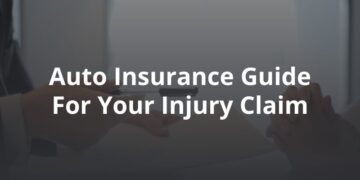A car accident can cause serious and painful injuries, including whiplash, broken bones, back injuries and brain injuries. In some cases, the pain of a car accident injury never goes away. Living with chronic pain can be frustrating and overwhelming, but know that you are not alone. A range of treatment options are available for chronic pain management.
What Is Chronic Pain?
Chronic pain refers to a sensation of pain or discomfort that persists for an extended period of time – typically, longer than the average healing time for an injury (around three to six months). Chronic pain can be dull, sharp, intermittent or constant.
Unlike acute pain, chronic pain can last long after the initial injury or condition is treated and has healed. Chronic pain after a car accident can develop as a result of an injury or nerve damage. It may also be triggered by post-surgical pain after an operation for a crash-related injury.
Short-Term Treatments
If you experience chronic pain after already receiving treatment for a car accident injury, your doctor may first recommend short-term treatments for pain management. This could include over-the-counter or prescription pain medications or the application of an ice pack in the affected area. Hot compresses can also provide chronic pain relief.
It is critical to properly take any pain medications or muscle relaxers prescribed to you by your doctor. Never take more than prescribed, as this can be dangerous for your health. Report any side effects or changes in your pain level to your doctor, as adjustments may be needed. If chronic pain continues, your medical team may recommend additional or long-term treatments.
Physical Therapy
Physical therapy is an essential treatment option for chronic pain management after a car accident. Your physical therapist will develop a personalized program based on your needs and level of pain.
Physical therapy can help to reduce pain in joints and muscles, improve strength and flexibility, increase range of motion, and strengthen your core to improve posture and balance. A physical therapist will use a variety of different exercises to promote healing, improve function and reduce pain.
Interventional Procedures
Interventional pain management procedures are a more aggressive treatment option than physical therapy. They may be used if prescription pain medications and physical therapy have not been effective.
Interventional procedures refer to a wide range of medical treatment options and services, including:
- Botox therapy
- Epidural steroids or injections
- Facet joint injections
- Ganglion impar block
- Hypogastric plexus block
- Intradiscal treatments
- Kyphoplasty
- Lumbar sympathetic block
- Peripheral nerve stimulation
- Platelet-rich plasma therapy
- Radiofrequency ablation
- Selective nerve blockers
- Spinal cord stimulators
- Trigger point injections
Your doctor may recommend one or multiple interventional procedures to address your chronic pain after a car accident in Texas if your pain status has not improved with rest, medication, physical therapy or other efforts.
Cognitive-Behavioral Therapy
Cognitive-behavioral therapy, or CBT, is a type of psychotherapy that focuses on changing negative thought patterns associated with chronic pain. CBT can help you develop coping skills and relaxation techniques that can help manage pain-related stress and anxiety.
Cognitive-behavioral therapy works by helping patients identify negative thoughts and behaviors and develop coping skills. While the level of pain may not actually be reduced with CBT, your perception or awareness of the pain can change. This can reduce its power over you and improve your overall quality of life.
Massage Therapy
Massage is an alternative type of therapy that may help manage chronic pain. As part of your treatment plan, massage therapy can help improve your mobility and assist with pain relief. It can help reduce muscle tension and promote relaxation. It is often recommended in conjunction or as a complement to other treatments, along with other alternative therapies such as acupuncture and chiropractic care.
Acupuncture
Acupuncture involves the use of thin needles inserted into specific pressure points on the body. This can create a balance in the flow of energy through the body by encouraging each pressure point to work together instead of separately. Acupuncture can help relieve pain and discomfort at pressure points and promote healing.
Chiropractic Care
Chiropractic care targets the musculoskeletal system to try to ease chronic pain in car accident victims. A chiropractor will use techniques such as spinal adjustments and manipulation to help restore balance in your body and facilitate natural healing processes. Your chiropractor may develop an exercise plan that you can do on your own to suit your individual needs. Chiropractic treatments can help improve mobility and offer chronic pain relief.
Self-Care
Chronic pain is not only a physical struggle but a mental and emotional one as well. Your approach to chronic pain management should be holistic and comprehensive, meaning it addresses both the physical and psychological aspects of pain. Self-care is important to implement as part of a chronic pain management regime.
Self-care is another term for mind-body practices that can be used for the management of persistent pain through the reduction of stress and an emphasis on overall well-being. Prioritizing self-care and implementing a few techniques into your routine can help you feel more in control of your life and reduce your pain levels.
A self-care plan may include:
- Eating healthy foods and staying hydrated
- Exercising regularly to improve strength and flexibility
- Using relaxation techniques, such as deep breathing exercises
- Practicing yoga, tai chi, or meditation
- Practicing mindfulness-based stress reduction
- Getting plenty of rest to aid the natural repair processes
- Maintaining connections to important people in your life
- Engaging in relaxing activities that you enjoy, such as reading or journaling
- Recognizing and avoiding triggers, such as environmental stressors
It is critical to take care of your mental health as well as your physical well-being as someone struggling with chronic pain after a car accident. Consider speaking to a mental health professional or joining a support group with other people dealing with chronic pain in your community.
Financial Compensation for Chronic Pain After a Car Accident in Texas
It is possible to manage chronic pain, regain control, and start enjoying your life again with the right pain management techniques. In many cases, healthcare professionals recommend a combination of multiple treatments for patients with chronic pain from car accidents.
If you wish to discuss seeking financial compensation for the medical care and treatments you need to manage chronic pain – as well as any related emotional stress and loss of enjoyment of life – contact an Austin car accident attorney at FVF Law for a free case consultation. Our attorneys have more than 100 years of combined experience. Call (512) 982-9328 today.





